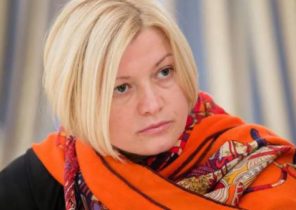
Long ago, in the year 370 ad, one 16-year-old boy came with his father to the public baths in the provincial city of Tagaste on the territory of Algeria. At some point, the father either saw her son’s involuntary erections, or saw that pubic teen hair appeared. This can hardly be called a historical event, if this boy was not thus Augustine, who in the future will formulate the foundations of Christian theology — are United as Catholics and Protestants — will be to explore the hidden depths of the spiritual world and inspire all of us the belief that the basis of human nature has a flaw. Perhaps it should be considered the most important Western thinker for the last half Millennium.
In his Confessions, written about 397 years, Augustine told about what happened in the baths many years ago. Patrician, his father, seeing the signs of his inquieta adulescentia, restless youth, was, as expressed by Sarah Raden (Sarah Ruden) in its new, strikingly lively translation of the “Confessions”, was “ecstatic” that soon he will have grandchildren. Easy — even centuries later — to imagine how I was embarrassed by this teenager. Instead, in memory of Augustine etched the incident when they returned home, “He happily told his mother about this… enjoying the intoxication, in which the world forgets You, its Creator, loves You and is Your creation”. (The confessions Augustine addressed to God.) Augustine’s mother Monica was a devout Christian and has reacted quite differently. Since God has already established in her heart his temple, she “was beside himself with godly excitement and fear.” So offensive, even to a person boys puberty was the reason —not the first and definitely not last —for a serious quarrel between his parents.
Patrician didn’t care about that Augustine spiritually evolved in the light of Christ and the manhood of the son of his only happy. In contrast, Monica has sought to drive a wedge between father and Augustine. “Mother tried to my father was more like You, Lord, than he,” wrote admiringly of the author “Confessions”.
However, in one father and mother were one — of their wonderful son was to receive an education corresponding to his talents. Young Augustine was sent to study in the nearby town Madaura, where he has achieved great success in literature and in oratory. The next step was the University in Carthage, opening the road to a profitable career of a lawyer or orator. A patrician, possessed of modest means, for a year collecting and saving up the money. Leaving Tagaste, Augustine is probably the last time you saw your father: in “Confessions” he writes that he was seventeen years old when he died. Mentions he with studied indifference.
Maybe the grieving widow felt after his death, some relief because we considered its effect on the beloved son threat-however, if she hoped Augustine immediately come to the path of chastity, she was quickly disappointed. “I came to Carthage; all around me a cauldron seething shameful love,” he wrote. His broken confession that he “stirred up a source of friendship with the dirt of lust” might point to Masturbation or homosexual experience. Other, equally vigorous and equally mysterious — statements allude to a series of unhappy relationships with women. However, the frenetic womanizing — even if it really was — was quickly replaced by a stable relationship. In a year or two, Augustine began living with a woman who, in his own words, remained faithful to the next 14 years.
From the point of view of Monica is probably supposed to look like at the moment the best option for her son — including his unbridled sexuality. Most of all she was afraid of rushing into a marriage that could hinder his career. A simple relationship was not so dangerous — even when there was born a son, who was given the name Deodat. By the standards of the time, this link looked pretty decent. According to the author of the “Confessions” —and other versions we have, — about his marriage with this woman, whose name he did not even call, it was not. Augustine expects that his readers will see the difference “between a peaceful marriage Union is concluded only for the sake of procreation, and passionate love connection”.
Augustine was proud of the intelligence and literary taste. He honed his oratorical skills, participated in poetic competitions, and consulted his astrologers, had mastered the complex and intricate philosophy, based on the Persian doctrine known as Manichaeism.
Their Manichaean beliefs Augustine brought together with the concubine and son from Carthage to Tagaste, where he taught literature, then back to Carthage, where he taught oratory, and thence to Mediolanum (Milan), where he became a famous teacher of rhetoric.
Augustine successfully make a career of a decade, but he had one problem which was the name of Monica. When he returned to teach at Tagaste, the mother did not want to live with him in the same house — not because of his mistress and the child, and because of his Manichaean beliefs. These beliefs-the belief that the world is a war of two forces, good and evil, —she was disgusted and she paraded sobbed as if her son died.
She cried even more when, on returning to Carthage, Augustine decided to go to Rome: “She got a hold of me, or wanting to return back, or to go along with me.” In the end, he lied to the mother, saying that just wants to say goodbye to a friend and convinced her to spend the night in the chapel near the harbour. “I lied to mother… had slipped away from her.”
Probably, the son still felt guilty. And yet, looking back on this case, he could not complain about his mother: “her for Her carnal longing whip fair whip pain”. The expression “carnal longing,” the carnale desiderium may seem more appropriate in relation to the mistress than for mothers. It seems that all that was missing or did not meet her in relations with her husband, Monica was moved to relationship with his son.
Gasping Augustine was forced to escape from it. The anguish I caused her this escape was, in the opinion of the son that is natural to women: “And in those agony apparent in her legacy of eve: lamentation searched for it that the wailing has created”.
In the Book of Genesis, the consequences of eve’s disobedience was twofold: women for him are forced not only to bear children in pain, but to be attracted to men who are dominated by. When Augustine writes about his relationship with his mother, he speaks both in the role of the child, and the role of her husband in agony, she led him into the world in the anguish pursued him through the world. Your son is not over for the yearning mother, the Carthaginian Harbor. Several years later, when Augustine moved to Mediolanum, Monica went to him on the ship from North Africa.
This time he did not escape. Although baptized, he was not ready, he told his mother that he was really impressed with Bishop Ambrose Medialuna. His message was undermined by the disdain Augustine to the biblical stories, which he earlier considered too simple and crude. What seemed to him absurdities, began to look deep mysteries. Long-established philosophical and aesthetic ideas of Augustine began to crumble.
Meanwhile, his career continued to develop. In the morning he met with the disciples, the day was talking with friends about philosophy. At this moment the mother now lived with him, decided to change his son’s life. She attended to his advantageous marriage and had found a suitable heir from a Christian family, whose parents gave consent to the marriage. But the girl up to the age of marriage was still two years away, so the wedding had to wait.
Meanwhile, Monica has made another change in the life of the son. The woman with whom he lived, were “cut off” from him, “as an obstacle to marriage”.
“My heart, adherent to her cut and it was bleeding,” writes Augustine. About the feelings of his concubines he says nothing, noting simply: “She returned to Africa, giving You vow not to know another husband.” After that she disappears from this story, leaving Augustine to suffer from sexual desire, which she used to meet. In the end, he quickly found himself a new mistress.
However, as Augustine himself will soon witness, the ways of the Lord are inscrutable grace. Less than a year he accepts the Christian faith. Soon after his baptism, he breaks the engagement, leaves the teaching, brings the eternal vow of chastity and decides to return to Africa, to found a monastic community. So, running away from his mother, he unwittingly began a spiritual journey surpassing her wildest dreams.
Characteristically, hugging Mrs. Clean (his own expression) he could completely rethinking the nature of sexuality. He needed to understand the causes of the power of excitation, an irresistible thrust, the pleasures and sorrows that accompany the quenching of passion. He did not look at these feelings from a safe distance, which provides a weakened libido, and tried to convince myself that they are abnormal. As a young man, has already become a father, he realized that the reproduction of the human race requires the intercourse, which he decided to give up. How can even the highest Christian spiritual calling to deny something so natural? In search of an answer to this question Augustine raised the controversial view of sexuality, which in the future will affect a lot of our history and acquire it special significance. This opinion was based not only on thorough analysis of the personal experience of Augustine, but also on the projection of that experience in the distant past of mankind.
A few days before departure to Africa, in the port city of Ostia, Augustine and Monica stood at the window, opening to the courtyard garden, and led a Frank conversation. Their conversation was sincere and encouraging, they discussed that no bodily pleasure, however strong it may be, does not compare to the joy of the saints. The evening ended with an unusual experience: “rising to Him my heart, all over the flares,” they felt that rise higher and higher, through space and the celestial sphere to the world of their own souls and to eternity, which lies beyond time itself. “And while we were talking about her and wanted her, we slightly touched her with all the thrill our hearts,” says Augustine.
The impressive power of this scene is difficult to convey in translation. Even harder to imagine what it meant for a 32-year-old son and 55-year-old mother through this experience together. Then it was over. “Suspiravimus, (we sigh), writes Augustine, and returned to the creak of our language, the words, appearing and disappearing”.
This moment of ecstasy shared with the mother was probably the most striking experience in the life of Augustine and Rebecca West (Rebecca West) suggests that it was “the most brilliant experience ever described in the literature”. Few days later Monica fell ill and soon died. This “Confession” is no longer to present a biography of Augustine and proceeds to philosophical musings about memory and about the first chapters of Genesis — as if this reflection was supposed to be a summary of his life. But why is he suddenly interested in this biblical book? And why in the future, his attention focused directly on the story of Adam and eve?
The pagans ridiculed their story, considering it primitive and ethically questionable. How can a deity worthy of veneration, not to allow people to know good and evil? Educated Jews and the Christians preferred not to dwell on this story or to distance themselves from him declaring his allegory. For Philo, a Greek-speaking Jew who lived in the first century in Alexandria, the first man, the man from the first Chapter of Genesis was not the creation of flesh and blood, and the Platonic idea. For Origen, the third century Christian, Paradise was not a place but a state of mind.
Archaic stories about the naked man and the woman, talking snake and magic trees some were ashamed. However, Augustine saved her from threatening her honorary oblivion. Thanks to him, she became so significant to the point that now about forty percent of Americans believe it to be true in the literal sense. Over the forty years that followed his famous appeal, forty years of endless debate, the possession of power and feverish creativity, he convinced himself that this story was not a fable and not a myth. On the contrary, it was his key to everything else.
This interpretation was based not only on his philosophical talents, but his memories of years ago about the signs inquieta adulescentia, forced by his father to his wife enthusiastically muttering something about future grandchildren. Reflecting on the story of Adam and eve, Augustine realized that the key to this his experience was not the fact of puberty, and her restless, uncontrollable nature. Fifty years later, he continued to think about this. Other parts of the body are in our power. If we are healthy, we can move them or not move at will. “When it comes to copulation, for procreation, the members do not obey the will, and waiting till the lust for its power this will encourage”.
How strange, thought Augustine, that we can’t dispose of one of the most important parts of your body. We are excited, this excitation is not outside, but within us-that is, in this sense, it is completely part of us, and yet it is not subject to our will. Of course, he judged the male body, but he was sure that the experience of women should be roughly the same, in fact identical — even if it is not so noticeable from the outside. That is why, after his crime, and the first man and the first woman felt ashamed and covered their bodies.
Augustine again and again back to the same questions: Who owns the body? Whence comes desire? Why is it impossible to control his penis? Why does he “sometimes does not, while the spirit wants, and sometimes does, although the spirit does not want to”. Even the aged monk in his cell, as recognized by Augustine in his treatise “Against Julian,” tormented “restless memories” violating his chastity and piety. Even the most pious married couple can not do anything without the “passion of lust”.
This passion, which Augustine calls “concupiscence” is not a natural impulse and not a blessing from God. She is the manifestation of evil. What do the couple to conceive a child of evil, Augustine emphasizes. It is good. “However, it is not done without evil.” Yes, sexual intercourse-as Augustine knew through long experience of relations with his concubine and other women-is the greatest of bodily pleasures. However, the strength of this pleasure is the bait, making it dangerously attractive: “one of the lovers of wisdom and Holy joys… would not agree that procreation was not accompanied by a similar lust”.
Augustine was reluctant to acknowledge that involuntary arousal is not only inevitably present in marital intercourse, but, as he writes, “is, regretfully movement even in his sleep, even chaste people.” That is the painful awareness of this fact has formed the most significant of his idea that transformed the story of Adam and eve and greatly influenced the history of the subsequent centuries: the idea of peccatum originale, original sin.
This concept has become one of the cornerstones of Christian Orthodoxy, but only after many decades of disputes. Chief among those who considered it ridiculous and disgusting, was a monk Pelagius, a native of Britain. Almost the same age as Augustine, he was in some sense his double — same upstart from the edge of the Roman world, with wit, charm and the will to reach the capital and seriously influenced the spiritual life of the Empire.
Pelagius and his followers were moral optimists. They believed that people are born innocent. Babies do not come into the world virtuous, but do not bear the stain of Vice. Of course, we are all descendants of Adam and eve and live in a world filled with the consequences of their disobedience. But the act committed by them in the distant past, not condemns us to inevitable sinfulness. It is simply impossible. How could we catch her? And how a good God could allow something so monstrous? No, we are free to lead their own lives and choose to serve us in the Lord or to Satan.
Augustine argued that we from the beginning marked by evil and it’s not in any specific atrocities or acts of violence, not social pathologies and not that this or that person made the wrong choice. Naive and foolish would think after Pelagius that we are starting with a clean slate that most of us are relatively decent people and that our power to choose good. In us there is something deeply, essentially wrong. Our entire species is, as wrote Augustine, massa peccati, a mass of sin.
Pelagians said that Augustine simply went back to the Manichean beliefs and considers the flesh of the creation and possession of the evil forces. This, no doubt, meant the betrayal of the Christian faith in the Word made flesh. No, objected to Augustine, God incarnate in man, but He chose to be born of a virgin, “whose conception would be from the spirit, not of the flesh, and it was preceded by faith and not lust” 4. In other words, the existence of Jesus had nothing to do with the lust through which beget other human beings, “Holy virginity was fertilized by faith, not by intercourse, for lust was ultimately removed so that what was supposed to be born from the seed of the first man, reproduced only the genus, but not the blame.”
The key word here is “wine”, crimen. We are affected by lust and it’s our fault. It is not the will of God, and the consequence of what we did. In search of evidence of our individual and collective betrayal Augustine refers to Adam and eve, because of original sin, Sully each of us, not only connected with our birth — that is, with sexual arousal, which has allowed our parents to conceive us, but goes back to the couple, that led to the human race. To protect God from accusations that he is responsible for the defects of His creation, Augustine had to prove that once in Heaven it could go differently and that originally Adam and eve were to not reproduce like we do. However, they are all distorted, making the wrong choice — a choice in which we all participate. In turn to do this, Augustine had to dig into the mysteries of the Book of Genesis is deeper than anyone before him. He had to reconstruct the lives of our ancestors, back to the garden of Eden and see how our grandparents make love.
For this, he thought, it is first necessary to understand the words of the Book of Genesis literally. Jewish history about the origin of humans may seem like one of those fairy tales, which he despised boys. However, the true believer must not consider it as a naive fable, which deep philosophical mystery. He needs to see her true story about the true story, accept it as reality and to convince others to treat her the same way.
Augustine undertook this project with his usual confidence. He began to write the work “Genesis”, which was going to talk about writing “in the direct sense of the events perpetrated” 5. In the end, he worked on this book for 15 years, despite the entreaties of friends to finish it and to present to the readers. Of all his many creations that he apparently devoted most of my energy and attention.
In the end, Augustine was defeated and he knew it. The problem was that, no matter how you try to literally understand every word of the book of Genesis still does not work. It is impossible to formulate a simple and reliable rule to determine the appropriate level of the literal. The Bible tells us that Adam and eve ate the forbidden fruit and “opened their eyes”. Does this mean that they were “born with their eyes closed, and Paradise sweets not remain as blind and not feeling the road to walk, not knowing the way to the forbidden tree and groping to disrupt the forbidden fruit?”. No, that’s impossible — we already know that Adam was given the animals and he gave them names, and for this he had to see them. We also know that eve saw the fatal tree, and found it “good for food and pleasing to the eye”.
However, Augustine emphasizes that “due portable the meaning of a single word in any case should not be taken in an allegorical sense everything.”
But how then to understand that to be understood? How Eva knew what he was referring to the serpent when he said to her: “your eyes will be Opened”? This is an important question — at least for Augustine it was incredibly important, because it was, in fact, about life and death, not only ancestors, but also all of their descendants. Nevertheless, a uniform method of interpretation it is still not found. “This is provided for discussion to the reader,” writes Augustine.
It is not surprising that Augustine so long to write this book — and that wherever it was possible, he clung to a literal value, like a drowning man for a straw. In the case of “opening the eyes” he was also convinced that it isn’t just a metaphor, it was something that Adam and eve really saw for the first time after his sin: “They stopped the eyes on their members (in eng. translation of “genitalia” — approx. transl.) and felt the lust in them, which I didn’t before”.
The key to this understanding was hidden in the personal experience of the Augustine. Inquieta adulescentia, once so admired by his father and horrified mother went up to that very moment when Adam and eve first felt lust and shame. They saw something never seen before, and it not only opened, but was forced to find Fig leaves to cover “the places of the koi against the will of their excited was the”6. Before that, they had perfect freedom, is unique, according to Augustine, human history. Now on their own inexplicable and frankly choosing to live not for God but for themselves, they have lost this freedom. And know shame.
But what they —and we with them-have lost? How they were to multiply, if not the same as multiplying all the animals known to man? In Paradise, wrote Augustine in his treatise “Against Julian,” sex between Adam and eve was stripped of involuntary arousal: “they are flesh, not raging passion would, she would be moving only the peaceful will by which we manage other members of our bodies.” Feeling no lust, no excitement, “the husband clung to the heart of the spouse with no passionate excitement, in complete tranquility of body and soul”7.
But how was it possible, asked Pelagian, if the bodies of Adam and eve were in essence the same as ours? Remember, said Augustine, that even in our current state, some are able to do with your body that it is impossible for others. “Someone knows how to skillfully move his ears, both together or alternately”. Other, as he saw, know how to sweat at will. There are even people that are able to emit from its rear end such musical sounds (without bad smell) that it seems that they sing to that organ. So why not imagine that Adam, being unfallen state, could not safely stretch your penis enough so that he could enter the womb of eve? This process would take place so quietly that the seed would fall into the bosom and the wife did not lose would at the same purity, the same girls keep their virginity with monthly expirations. “Physical purity” of her husband, too, would be threatened.
So had to copulate Adam and eve. But, says Augustine, they have never experienced it. Sin happened before and “they deserved the expulsion from Paradise, before he had a chance for a peaceful movement will copulate to produce offspring.” So why do have to imagine what might be their sex life? Of course, this was due to the controversy surrounding the Christian faith, attempts to refute Manichaeism and Pelagianism and the image of Jesus as a miraculous child of a virgin who got pregnant without lust. However, it was not only in theological ideas. The roots of Augustine’s obsessive interest to the story of Adam and eve need to look at his past. What he discovered —or rather invented — sex in Paradise, to prove to him that people source was not supposed to go through the troubles that plagued him in his youth and after it. It was proved to him that he wasn’t supposed to feel those passions, which pushed him in the brothels of Carthage. And most importantly, it proved to him that, after redemption, to which he aspired he will not have to feel that again and again he felt with his concubine — mother of a single child with the woman he sent away at the insistence of his mother, the one that promised never to be with another man — like he wouldn’t be with another woman, the one that was “cut off” from him.
Adam fell, Augustine wrote in “city of God”, not because he was deceived of the serpent. He chose to sin and lost Paradise because he could not part with his only friend. Augustine himself tried as possible to his fallen condition — to fix the fateful choice Adam. With the help of his Holy mother, he got rid of his girlfriend and then tried to get rid of the passion, the excitement. He remade himself — as he could with his outstanding talents on the model of the unfallen Adam, who for many years tried to understand and recreate. He is still bothered by unwelcome dreams and involuntary passion, but everything he knew about Adam and eve in a state of innocence, to convince him one day, with the help of the Lord, he will gain full control over their own bodies. And then he will finally be free.







